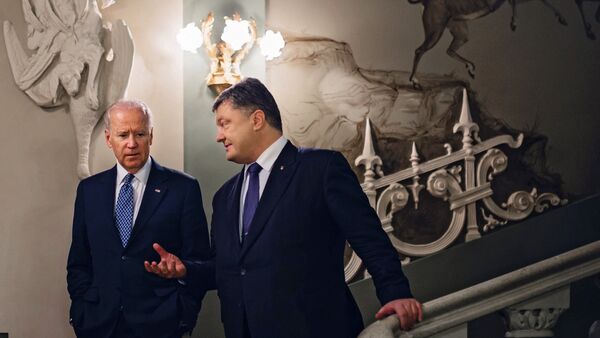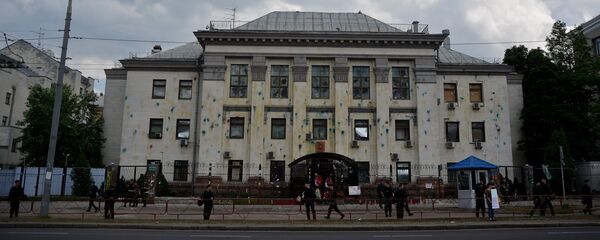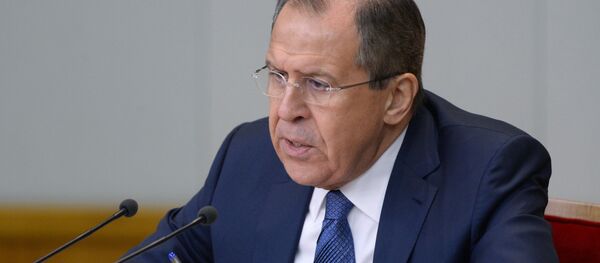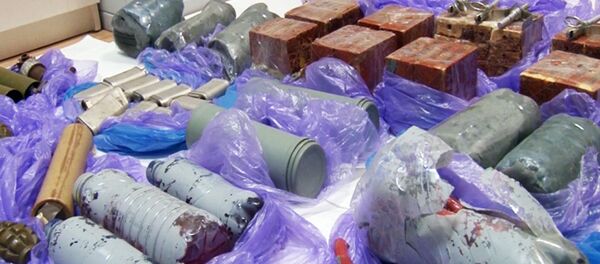On Friday, US Vice President Joe Biden telephoned Ukrainian President Petro Poroshenko, urging Ukraine and Russia to avoid a further escalation of tensions over the situation in Crimea, a statement released by the White House said.
According to the statement, the two officials also agreed on the importance of using "diplomatic means" to implement the Minsk accords, which would assist Kiev in "restor[ing] Ukraine's sovereignty and territorial integrity."
Mogherini reiterated Brussels' "unwavering" support for Kiev, emphasizing that the EU does not recognize the "annexation" of Crimea, but also said that a peaceful resolution to the conflict was the only possible solution. This applies to the civil war in the east of the country as well, with the official noting that all parties must "fully engage in the complete implementation of the Minsk agreements."
Commenting on the Western officials' statements, Russian Senate Foreign Affairs Committee chairman Konstantin Kosachev suggested that they were an indication that Europe and the United States had shown themselves "not ready to support the Ukrainian authorities as unconditionally as before."
Effectively, the senator suggested, Biden and Mogherini's calls for 'all sides to play their part' in deescalating the conflict should be seen as an improvement from the kinds of rhetoric previously used, which basically amounted to "we are with you, Russia is to blame for everything."
The latest chapter in the diplomatic standoff between Moscow and Kiev began last Wednesday, when Russia's Federal Security Service said that they had discovered a spy ring in Crimea, organized by the Ukrainian Defense Ministry. The suspects were said to be preparing acts of sabotage and terrorism against the peninsula's infrastructure. The explosive story caused further outrage in Moscow due to the fact that two serviceman – an FSB officer and a military serviceman, were killed in the operation to arrest the suspected saboteurs.
For his part, Ukrainian political commentator Dmitri Skvortsov warned against lending too much weight to the Western officials' remarks. Effectively, the journalist suggested that Poroshenko and Biden are really just trying to take the 'goodwill' card out of President Vladimir Putin's hand, with Kiev presenting itself as the reasonable and responsible partner, "looking for every last opportunity" for negotiations with an angry Moscow.
Skvortsov suggested that the reality is that Washington and Brussels' response showed no real signs of disappointment or concern with Kiev, even if it did avoid blaming Russia for everything. In any case, Western officials continued with their standard commentary about Russia's "occupation of Ukrainian territory."
Asked whether Kiev has overplayed its hand with the Crimean sabotage operation, the analyst suggested that factually, "Ukraine had done that a long time ago," first by blocking off the North Crimean Freshwater Canal in 2014, and then through the so-called 'electricity blockade' a year later, and finally by Kiev politicians' repeated threats to blow up the Kerch bridge that's set to connect Crimea to the Russian mainland.
In spite of all this, Skvortsov noted, "the West continues to tolerate these antics of 'their son of a b****', which only makes Kiev more confident." At the same time, the commentator pointed out that Western leaders have actively chosen to ignore Russia's version of events in the Crimea story.
For his part, Ukrainian political scientist Evgeny Filindash told the online newspaper that he has a different position. In his view, when it comes to the Ukrainian issue, Washington's main goal is now to preserve the situation in a more-or-less 'frozen' condition until the fall, when the outcome of the American presidential election becomes known. At that point, it will become the next president's responsibility to decide how to proceed.
Asked whether he believed Moscow's version of events in Crimea, Filindash noted that there was no doubt in his mind. "If Kiev (using so-called 'activists') was ready to blow up power lines on their own territory in the Kherson region, just to bring harm to Crimea, then why not try to organize bombings on the peninsula? The goal, as before, was to distract Ukrainians from the catastrophic decline in living standards, to the latest shock in utilities prices, etc., by creating another round of tensions with the 'Russian enemy'."
Fortunately, the analyst suggested, a full-scale war remains highly unlikely. However, "an aggravation of the situation involving localized fighting in the Donbass may very well follow."
Ultimately, Filindash emphasized that Kiev's status as a client state to Washington means that the importance of the upcoming US elections cannot be overestimated. "After that, regardless of who becomes the new president – Trump or Clinton, a reformatting of Ukraine's government will take place. This can happen either by early elections (including presidential ones), through another coup, or through some other way, but it will inevitably occur."






